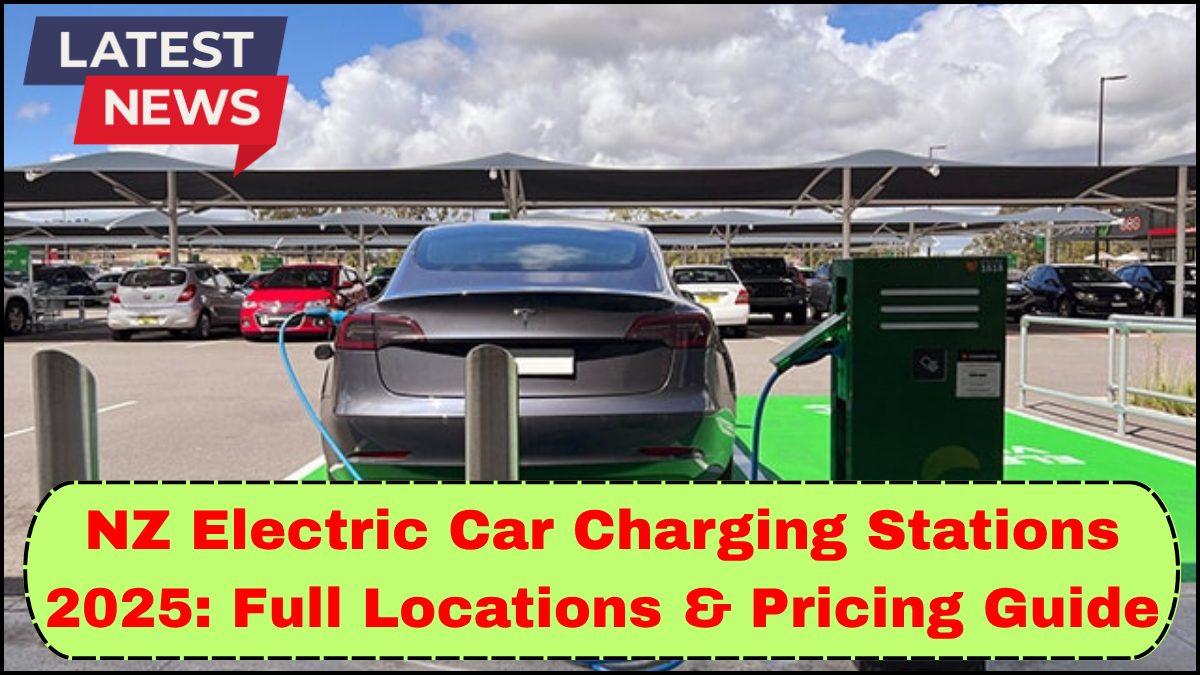New Zealand is accelerating its electric vehicle (EV) transition, and 2025 is shaping up to be a pivotal year. With more drivers switching to electric, understanding where and how to charge your EV is essential. This guide provides a complete overview of NZ Electric Car Charging Stations in 2025, including detailed locations, current pricing, and insight into the national charging network.

Overview of NZ’s EV Charging Infrastructure
As of 2025, New Zealand has over 2,000 public electric car charging stations nationwide. The government and private sector have significantly expanded coverage across urban, rural, and intercity routes. This includes fast-charging stations on major highways and destination chargers in key tourist and commercial hubs.
The national EV charging network is led by providers such as ChargeNet, Z Energy, BP EV, Tesla Superchargers, and regional councils. Each offers varying charging speeds, membership options, and pricing models, creating a competitive and user-centric landscape.
Charging Station Types in New Zealand
There are three primary types of EV charging stations in NZ:
- Level 1 (Standard Charging): Found in homes and some workplaces. These use a standard household plug and offer slow charging (up to 10 km/hour).
- Level 2 (Fast Charging): Common in public carparks, supermarkets, and city centers. Speeds range between 7kW to 22kW.
- DC Fast Charging (Rapid Chargers): Found along highways and in major urban centers. Power output ranges from 50kW to 300kW, providing up to 400 km of range in 30 minutes depending on the EV model.
Key Charging Locations Across NZ
The most comprehensive EV charging locations can be found in:
- Auckland: Over 300 stations including multiple rapid chargers. Strategic placements at malls, CBD, and transport hubs.
- Wellington: More than 100 chargers, including several fast-charging hubs along SH1 and SH2.
- Christchurch: A strong network of over 150 charging points, with a focus on renewable-powered stations.
- Queenstown & Rotorua: Equipped with high-speed chargers for tourist routes.
- Rural NZ: EV charging reach is extending through regional investment, especially in Northland, Gisborne, and Southland.
Use apps like PlugShare, Power Trip, or ChargeNet’s locator for real-time location data and charger availability.
Pricing Breakdown: What to Expect in 2025
Charging costs vary depending on the provider, location, and speed:
- Home Charging: Approximately $0.25 – $0.30 per kWh. Ideal for overnight charging.
- Public Level 2 Charging: $0.40 – $0.50 per kWh. Some councils offer free Level 2 charging in select areas.
- DC Fast Charging: Typically $0.60 – $0.75 per kWh. Idle fees may apply if vehicles remain plugged in post-charge.
Subscription models are emerging as a way to lower per-kWh pricing, especially for frequent users. For example, ChargeNet offers membership plans with reduced rates and priority support.
How to Pay & Access the Network
Most NZ electric car charging stations offer payment via:
- Mobile apps (ChargeNet, Evie, BP EV)
- RFID access cards
- Contactless debit/credit card payments
Some charging stations require pre-registration or preloading of account credit. Others offer pay-as-you-go functionality.
Tips for Efficient EV Charging in NZ
- Plan Ahead: Use apps to map your route and check charger availability.
- Avoid Peak Hours: Charging during off-peak times can reduce waiting and grid strain.
- Combine Charging with Errands: Choose chargers near supermarkets, cafes, or gyms.
- Be Considerate: Move your vehicle promptly after charging to free up space.
The Road Ahead for NZ’s EV Charging Network
Looking beyond 2025, NZ is aiming for full EV infrastructure coverage by 2030. This includes:
- Solar-powered stations
- Wireless charging pilots
- Integrated billing across networks
- Real-time usage data via smart charging systems
The Ministry of Transport and EECA are also backing initiatives to ensure equitable access in remote communities and apartment buildings.
FAQs on NZ Electric Car Charging Stations 2025
Q1: Are all EVs compatible with NZ charging stations?
Most EVs use Type 2 (AC) or CCS2 (DC) plugs, which are standard across NZ. Tesla models have adapters for wider compatibility.
Q2: Can I charge my EV at home without upgrading my wiring?
Standard outlets work but are slower. An electrician can install a dedicated EV charger for faster, safer home charging.
Q3: Are there any free charging stations?
Yes, some councils and retailers offer free charging, especially Level 2 chargers in public parking areas.
Q4: Do charging prices differ between the North and South Island?
Slightly. Urban areas typically have more competition, resulting in lower rates. Remote areas may have higher pricing due to infrastructure costs.
Q5: How reliable is the charging network?
Uptime is high, especially with major providers. Most networks offer 24/7 customer support and live status updates via apps.
click here to learn more